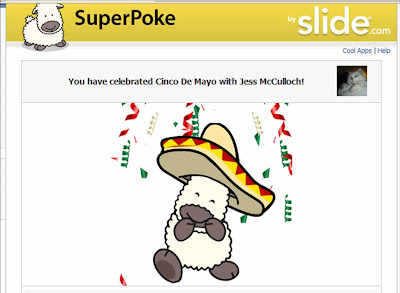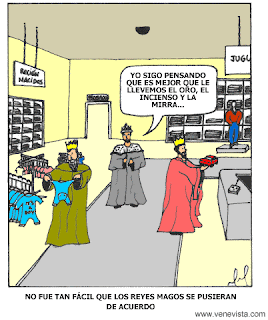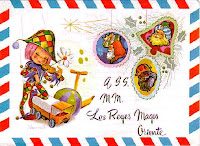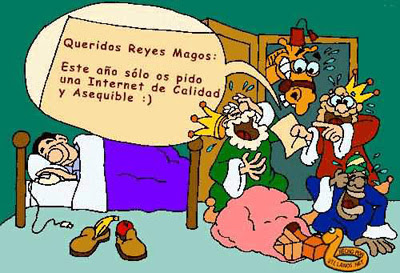[youtube http://www.youtube.com/watch?v=d-u54LFG_m0&hl=en&fs=1]
¡Vámonos!
(I know – the picture that’s used as the screenshot of this clip is bizarre!)
28th December is el Día de los Santo Inocentes in Spain (and other Hispanic countries – found a clip from Venezuela too) – their equivalent of April Fool’s Day. I think it’s a great time of year to have a day of practical jokes as it’s in that awkward ‘lull’ period between Christmas and New Year, and also as it’s the time when people are visiting relatives and friends so gives much more scope for ‘inocentadas’ or jokes.
Have a look at this description of the day and for some ideas, check out this site which offers suggestions of jokes you might like to play! Here’s another list of suggestions – one of which involves salt to make people think you have dandruff!!
Other ‘bromas’ might include some of the following-
[youtube http://www.youtube.com/watch?v=zrif_HHU36U&hl=en&fs=1]
And here’s a clip from The Simpsons where Bart plays a joke on Homer – (sorry video quality is poor – Twentieth Century Fox have had most clips removed!!)
That’s a bit extreme I guess!
Now I’ve broken up for Christmas holidays, I’m ill – isn’t it always the way with teachers? So, to get myself in the Christmas spirit, and because it is very funny – and true! – here’s the inimitable Stephen Fry explaining a couple of rather particular Catalan traditions. Perhaps not the clip to use to explain it in class though!!
Warning – these clips contain coarse language that may offend.
And here’s a clip of children attacking their Caga Tio!
[youtube http://www.youtube.com/watch?v=LksInINGTVs&hl=en&fs=1]

As I sat poking people on Facebook – as I am prone to do as a form of stress release – I was inspired to blog. Not a normal occurence admittedly, being inspired to do anything serious on FB but this time the poke was the catalyst.
As you can see from the image, I ‘celebrated Cinco de Mayo with‘ many of my FB friends, and it struck me that I knew not why I would want to celebrate today! So I
decided to do some research – and it’s nothing to do with dancing sheep!
Wikipedia informed me that …
‘Cinco de Mayo (Spanish for “5th of May”) is primarily a regional and not an obligatory federal holiday in Mexico. The holiday commemorates an initial victory of Mexican forces led by General Ignacio Zaragoza Seguín over French forces in the Battle of Puebla on May 5, 1862. The date is observed in the United States and other locations around the world as a celebration of Mexican heritage and pride.’
and goes on to point out that it is not Mexican Independence Day as this falls on September 16th.
It seems that the day, celebrated with music, dance and food (as all good fiestas should be), is mainly celebrated by Mexicans living in America, and that it is really only celebrated within Mexico in the Puebla region where the battle was fought.
As I was looking for information,I came across a number of interesting web sites that teach more about the origins and celebration of Cinco de Mayo.
Kaboose has a number of craft activities (such as making a taco or Mexican sombrero), recipes and printables (such as colouring pages and wordsearches) for the day as well as a history section.
Here’s the site for the Cinco de Mayo Fiesta in Portland, Oregon, celebrating the festival of its sister city, Guadalajara, and organised by the Portland Guadalajara Sister Association
(I like this idea of having a sister city whose festivals you celebrate – great for broadening knowledge and understanding)
Then I came across a lovely site with a really accessible webquest about Cinco de Mayo, perfect for dipping in and choosing bits that you fancy using. It offers lots of links – most of them seem to be active (sometimes a pitfall I find with webquests I discover is that the links are dead ends which is really frustrating) I also like the student rubric outlining what is expected of a good group member, and how group work will be graded – something to consider for next collaborative topic I set perhaps. There are even teachers notes – as they say, the webquest / topic is designed to last several weeks so it would be a case of picking and choosing!!
And then there’s the 42explore site where there are loads of links to other sites – unfortunately, several of the ones I tested were dead, but you can learn how to make a piñata, or a poncho, or go on a shorter webquest to make an information book about Cinco de Mayo. And at the bottom of the page, there is a short interactive glossary of words related to the festival.
And, just to finish off the post, here are a couple of videos of the festivities. Firstly, a news report explaining the fiesta –
and here are the festivities in Charleston…..
Finally, a traditional folkdance from West SaintPaul, Minnesota.
So – now I know what it’s all about –
¡Feliz Cinco de Mayo a todos!

Hot on the heels of yesterday’s e-mail from CILT about Europe Day (see yesterday’s post), today I received a message from Pamela Powers at the European Parliament about Spring Day in Europe;
Spring Day in Europe was set up to promote learning and debate about the European Union in schools.
As 2008 is the European Year of Intercultural Dialogue, “Bridging cultures through dialogue” is the chosen theme for Spring Day 2008. It will be held from 25th March to 30th June, with a special focus on 9th May, which is Europe Day. Schools across Europe are invited to take part.
The Spring Day in Europe website provides teachers and students with ideas for events and activities in the classroom. For further information and to register your school, please look at the Spring Day website: http://www.springday2008.net
Once registered, you will have access to the full package of teaching and learning resources, activities, tools and services of the web portal.
The teacher adviser for the UK is Ian Levinson . He is a contact point between European Schoolnet and schools that register with Spring Day in Europe and is able to advise and answer questions.
Investigating the Spring Day website, it seems that there are various benefits to registering for the day – such as involvement with other classes and schools, taking part in competitions and receiving a certificate of participation for your involvement – always popular in schools with SMT :o)
Content is in 23 different languages, allowing for access to the site in the language studied as well as English, and the ability to compare text (and I assume activities) in different languages. At the same time, the whole day is based on the discovery of other cultures and traditions, thus covering ICU strand. There are online games, ecards to send and podcasts too which make my evolving techie side smile! You can find out more about activities, past events and how to register on the Spring Day for Europe 2008 site.
At the time of writing there are 1113 schools registered – I’m about to make it 1114.
What about you?
A lovely video from Buenos Aires, Argentina. Just right for today!
¡Feliz Día de San Valentín!
 I was off line for the New Year so a belated Feliz Año Nuevo to you all. And whilst my in-laws have no Internet access, they do have SKY so I was able to see in the New Year at 11pm GMT with those in the Puerta de Sol in Madrid on TVEi – and eat my ‘uvas de la suerte’ just like Gretel (clever pooch!). I discovered that, as well as ensuring you eat all 12 grapes to ensure your good fortune, your underwear has a deciding factor in your luck for the coming year. If you wear red undies, apparently it will bring you good luck and love. In Mexico, if you carry a suitcase onto your balcony, you’ll go on lots of trips, and by putting money on you windowsills, you won’t be short of money. If only …..
I was off line for the New Year so a belated Feliz Año Nuevo to you all. And whilst my in-laws have no Internet access, they do have SKY so I was able to see in the New Year at 11pm GMT with those in the Puerta de Sol in Madrid on TVEi – and eat my ‘uvas de la suerte’ just like Gretel (clever pooch!). I discovered that, as well as ensuring you eat all 12 grapes to ensure your good fortune, your underwear has a deciding factor in your luck for the coming year. If you wear red undies, apparently it will bring you good luck and love. In Mexico, if you carry a suitcase onto your balcony, you’ll go on lots of trips, and by putting money on you windowsills, you won’t be short of money. If only …..
Tomorrow it will be El Día de Reyes in Spain and other Hispanic countries, the day on which presents are traditionally delivered by the Three Kings. Epiphany is a big deal in Spain with parades called cabalgatas in most towns when the Reyes Magos arrive on their camels (or sometimes in a boat in Barcelona or Málaga) on the evening of the 5th before distributing presents overnight into the waiting shoes left out on balconies with some straw for the camels. For photos, check out El País.com where there are a number of good quality pictures from 2007. There are a number of clips of these processions on Youtube – there is a slideshow from Priego, Córdoba with stills and short clips of their parades accompanied by an interesting music (!) and one from Rociana in Huleva features some very generous Reyes who are throwing rather large parcels instead of the usual sweets into the crowd.
I also came across a couple of amusing videos. The first is El rap de los Reyes Magos in which they plot (and execute) the downfall of Santa who is increasingly taking over present giving duties – not recommended for use with young children! And the second below is entitled Los padres son los Reyes Magos.
 On the subject of presents, there’s a short voxpop clip in Spanish about the cost of buying presents for Reyes – good for more confident learners or for gist. Perhaps listen out for presents, or for the number of children / grandchildren people have, or even for cognates. A good discussion starter.That’s a bit tricky for younger learners, but they could write simple letters to los Reyes with their present requests – two sites to do this online are El Boricua from Puerto Rico and espacio.ya.com – in English or Spanish – or even draw and label them.
On the subject of presents, there’s a short voxpop clip in Spanish about the cost of buying presents for Reyes – good for more confident learners or for gist. Perhaps listen out for presents, or for the number of children / grandchildren people have, or even for cognates. A good discussion starter.That’s a bit tricky for younger learners, but they could write simple letters to los Reyes with their present requests – two sites to do this online are El Boricua from Puerto Rico and espacio.ya.com – in English or Spanish – or even draw and label them.
And what would a festival be without a song – here’s one version of
‘Aquí vienen los reyes’ – the words seem sweet but unfortunately there is no music but the more usual version seems to be this one. As the site points out, it’s a bit odd as it suggests that the Reyes Magos can see Holland – either they have very good telescopes or they’re very lost ;o) There’s a .mp3 file with this one – always helpful if you want to use it and have no idea how it goes – but here’s another version by Rayito ‘con sabor flamenco y rumba’.If you’re interested in French resources for Epiphany, Jo Rhys-Jones has provided some ideas and links on Talkabout Primary MFL.
And, as the prospect of returning to work dawns, this cartoon sums up my request to the Reyes Magos … ¡Felicidades!
¡Vámonos! ©2026. All Rights Reserved.
Powered by WordPress.
Theme by Phoenix Web Solutions




